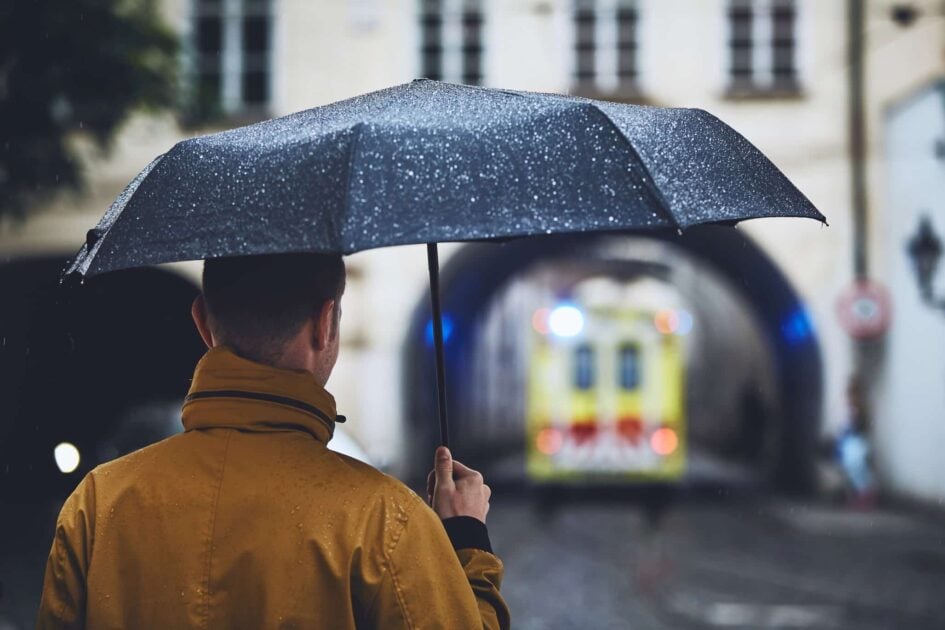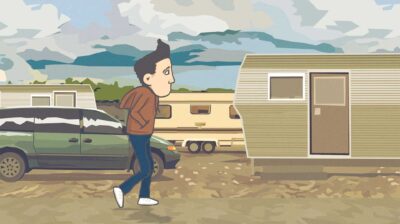How do I apply for Emergency Accommodation?
If you become homeless and have nowhere to sleep for the night you can apply for Emergency Accommodation

Emergency accommodation is a place for you to stay in if you are made homeless. The accommodation is provided as an emergency and short-term solution to homelessness.
The current housing crisis has caused the number of homeless young people in Ireland to rise due to the lack of affordable rental accommodation and social housing. If you are worried about becoming homeless, where possible you should reach out to family and friends for support, or get in touch with a homelessness support organisation. They may be able to provide you with temporary accommodation while you try to find a more permanent solution.
What types of emergency accommodation are there?
The most common types of emergency accommodation for single people or couples are hostels. Other places used for emergency accommodation include bed and breakfasts, hotels and family hubs. These places are used in situations where hostels are not suitable and are primarily provided to families. However, they can be provided if you have special medical or social needs, depending on availability.
Hostels
Hostels can be used as long or short-term accommodation, and some provide meals and other services. Some hostels may charge on a weekly or nightly basis. However, the local authority can waive the fee on a case by case basis.
People can be placed in a hostel on a night by night basis, or they may get a rolling booking on a weekly basis. A rolling booking is when the booking continues for a certain period until the hostel is told otherwise. Some hostels also provide three month placements known as Supported Temporary Accommodation (STA). In STAs, onsite support workers are available to support the residents.
Family Hubs
Family hubs are used for families with children who are experiencing homelessness. Family Hubs have the security of on-going placement that a hostel or hotel might not provide. Hubs also have separate bedrooms, spaces for play and homework and either provides a communal kitchen or meals. Find out more about family hubs.
There are extra supports available for homeless families. Children under the age of five with parents who are homeless (or homeless transitioning to permanent accommodation) get 25 hours of free childcare a week. This includes 15 hours of free pre-school where children are eligible, or school hours. It also includes a daily meal. Public transport is also free to those living in emergency accommodation to cover school journeys and family travel.
Refuges
Women and children who are victims of domestic violence may be accommodated in dedicated refuges for protection. It is important to know that these are not considered homeless accommodation by some local authorities and some may not recognise the woman and children as homeless. SAFE Ireland provide information on refuges for women and children around Ireland. Men experiencing domestic abuse can seek advice from Men’s Aid – unfortunately there are no domestic abuse refuges for men in Ireland.
How do I apply for emergency accommodation?
If you are homeless, you need to present to your local authority. They will assess whether you are eligible for support.
Contacting your local authority
If you are homeless, you should contact your local authority and let them know you are homeless. They will then do an assessment to determine what type of support they can offer you. Find more information on accessing emergency accommodation in Dublin, Cork and Galway below.
If you are outside of these cities, contact your local authority directly.
What does the assessment to get emergency accommodation involve?
To be eligible for emergency accommodation, you will first have to go through an initial assessment of your personal situation and details. This includes:
- Proving your identity: be sure to have some photo ID
- Providing your accommodation history: you will need to confirm where you have lived beforehand and for how long. Make sure you bring proof of your last permanent address
- Showing support and need for emergency accommodation: you will need to provide proof of homelessness (e.g. an eviction notice or copy of lease agreement) to have your needs checked
- Checking your eligibility for social housing support: you will need proof of income
- In the case of under 18s, the Tusla social worker will assess the situation of the young person individually
Can I access emergency accommodation if I am under 18?
If you are under 18, it is the responsibility of the Child and Family agency (Tusla) to respond to your needs if you are homeless. If you are homeless or at risk and are under 18, you need to contact your local Tusla office. If your local office is closed, you should go to the nearest Garda station, and they will contact the on-call social worker to help you.
Accessing emergency accommodation in Dublin, Cork and Galway
Find more information on accessing emergency accommodation in Dublin, Cork and Galway below. For outside of these areas, contact your local authority.
Dublin
If you are sleeping rough, contact Dublin’s Housing First Intake Team by phoning 086 8139015 from 9am to 11pm, 7 days a week until 11pm.
- Dublin City Council’s Central Placement Service: If you have never stayed in homeless accommodation before, the Central Placement Service will assess your situation and inform you of your options. You can visit the service at Parkgate Hall, 6-9 Conygham Road, Dublin 8 from 10am to 12pm and from 2pm to 4pm, Monday to Friday. For assistance outside of these hours, you can contact the Homeless Freephone at 1800 707 707 between 10am and 10pm or email [email protected]. If you have previously stayed in homeless accommodation, you should call the Homeless Freephone.
- Fingal County Council’s Assessment and Placement Service : If you have never been homeless before, you can visit the service at Housing Department, Fingal County Council, Grove Road, Blanchardstown, Dublin from Monday to Friday from 9.30am to 12.30pm. If you have already presented to the Homeless Unit and have been assessed as homeless, call 01 890 5800 to make an afternoon appointment. Alternatively, you can email [email protected]
- Dun Laoghaire-Rathdown County Council’s Assessment and Placement Service: The Placement and Assessment Section is open to new presentations and appointments only from Monday to Friday between 10am and 12pm. Afternoons from 12pm to 4pm are for repeat presentations, or anyone who has made an appointment to meet with the team. You can visit the service at Housing Department, Dun Laoghaire-Rathdown County Council, County Hall, Marine Road, Dun Laoghaire. For any other queries, the placement and assessment team can be contacted at 01 205 4700 between 10am and 5pm, Monday to Friday. For out of hours contact the freephone 1800 707 707 or email [email protected]
- South Dublin County Council’s Assessment and Placement Service: Present Monday to Friday from 10am to 12pm at Housing Department, South County Council, County Hall, Tallaght, Dublin 24, or phone (01) 414 9000 from 10am to 12pm and 2.30pm to 4pm. Outside of these hours, contact the freephone at 1800 707 707
Should you require an emergency placement outside of the hours above, contact the freephone number for homeless placements at 1800 707 707.
Check homelessdublin.ie for updates to services.
Cork
Those presenting for emergency accommodation are assessed in City Hall by Cork City Council staff, who will then refer the client to the appropriate emergency accommodation.
During office hours you can contact the Accommodation Placement Service on (021) 492 4248 or call to the office at the junction of Anderson’s Street and Lower Oliver Plunkett Street from 10am to 12pm and 2pm to 4pm, Monday to Friday. Out of hours you can contact the Cork Simon Outreach Team at (021) 427 8728.
Read more about emergency homeless services in Cork.
Galway
If you are in need of emergency homeless services, you should register yourself as homeless at the Housing counter at Galway City Council’s offices at Galway City Council’s Housing Department, City Hall, College Road, Galway. It is open from 9.30pm until 1pm from Monday to Friday. You can also phone 091 894 372.
If you require assistance outside these hours, contact COPE Galway on freephone 1800 788 887.
Emergency accommodation for non-Irish Citizens
If you are not an Irish Citizen, accessing emergency accommodation may be dependent upon your residency rights, the length of time you have been living in Ireland and also how long you have been living in a specific area.
How to get emergency accommodation if you are not an Irish Citizen
If you are not an Irish Citizen and are from the European Economic Area or any country outside Europe, contact the 24 hour freephone on 1800 724 724. You will be provided with an emergency response/ temporary accommodation on a one night basis.
You will then need to go to the New Communities Unit in your local authority to be see if you are eligible for social housing supports. If you are not eligible, you need to contact the New Communities section of your local authority. If they cannot assist, call into the New Communities Unit at 77 Upper Gardiner Street, Dublin 1 from 10am to 11.30am or 2pm to 3.30pm, Monday to Friday. You can also phone them at 01 673 2030.
What is the Housing First Initiative?
People in emergency accommodation for long periods of time may be able to access the Housing First initiative. This initiative allows the possibility of access to permanent housing. The Housing First Initiative aims to support people who have experienced homelessness on a long-term basis to move from using emergency accommodation or rough sleeping into their own home. Tenancy as well as physical and mental health supports are provided as needed. This initiative, aimed at the most vulnerable homeless people, supports the idea that a stable home and health support is the best way to make sure people stay out of homelessness for good.
Supports guide for young people
Knowing your rights when renting accommodation can really help, especially if you’re facing issues with your landlord around deposits or rent increases. The government has recently developed a dedicated support guide for young people. In it, you can find information on social housing, your rights as a tenant, emergency accommodation, and other information on topics including social welfare, education and training.
Feeling overwhelmed and want to talk to someone?
- Get anonymous support 24/7 with our text message support service
- Connect with a trained volunteer who will listen to you, and help you to move forward feeling better
- Whatsapp us now or free-text SPUNOUT to 50808 to begin.
- Find out more about our text message support service
If you are a customer of the 48 or An Post network or cannot get through using the ‘50808’ short code please text HELLO to 086 1800 280 (standard message rates may apply). Some smaller networks do not support short codes like ‘50808’.






